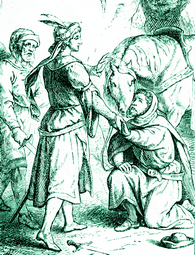Lives of the Saints
Our Models and Protectors
Spiritual Bouquet:
July 12

Saint John Gualbert
Founder
(999-1073)
Saint John Gualbert was born in Florence in the year 999. He was raised with care in piety and the study of the humanities, but no sooner had he entered adult life than he acquired a taste for pleasures. God, desiring to save and sanctify him, found a means to open his eyes. He was following the profession of arms at that troubled period, when on Good Friday, as he was riding into Florence accompanied by armed men, he encountered his brother's murderer in a place where neither could avoid the other. John would have slain him, according to the customary vengeance of those times; but his adversary, who was totally unprepared to fight, fell upon his knees with his arms outstretched in the form of a cross, and implored him, for the sake of Our Lord's holy Passion, to spare his life. Saint John said to his enemy, I cannot refuse what you ask in Christ's name. I grant you not only your life, but my friendship. Pray that God may forgive me my sin! They embraced and parted; grace had triumphed.
A humble and changed man, he went to a nearby abbatial church, and while he prayed with fervor for forgiveness, the figure of our crucified Lord, before which he was kneeling, bowed its head toward him, as if to confirm His pardon and manifest His gratitude for the generous pardon John himself had granted. Abandoning the world then, Saint John devoted himself to prayer and penance in the Benedictine Order. His virtue and austerity were so great that when his abbot died, he was unanimously chosen to replace him; but he could not be prevailed upon to accept that honor. He retired to Vallombrosa, which became the cradle of a new Order which followed the Rule of Saint Benedict in all its austerity. It was from this shady valley, a few miles from Florence, that the Order spread over Italy.
Once during a time of famine, he went to the nearly empty storeroom, and at his prayer the provisions multiplied to the point that he could distribute grain to all his houses and to all the poor who presented themselves. On an occasion when he found one of the monasteries too rich, he prayed a stream flowing past it to take on the violence of a torrent and overturn the building. This was done without delay. Another time, the enemies of the Saint came to his convent of Saint Salvi, plundered it and set fire to it and, after treating the monks with ignominy, beat them and injured them. Saint John rejoiced. Now, he said, you are true monks. Oh, how I envy your lot!
Saint John Gualbert fought vigorously against simony, and in many ways promoted the interests of the Faith in Italy. After a life of great austerity, he died while Angels were singing near his bed, on July 12, 1073.
Reflection: The heroic act which merited for Saint John Gualbert his conversion was the forgiveness of his enemy. Let us imitate him in this virtue, resolving never to revenge ourselves in thought, in word, or in deed.
Vie des Saints pour tous les jours de l'année, by Abbé L. Jaud (Mame: Tours, 1950); Little Pictorial Lives of the Saints, a compilation based on Butler's Lives of the Saints, and other sources by John Gilmary Shea (Benziger Brothers: New York, 1894).